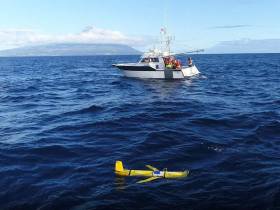Displaying items by tag: Laochra na Mara
Irish Research Marine Glider Deployed In North Atlantic On New Project
The Marine Institute’s marine glider has been deployed in the North Atlantic as part of a deep ocean marine science research project.
Laochra na Mara can reach depths of 1,000m and collects oceanographic data on conductivity, temperature, depth, fluorescence, turbidity and dissolved oxygen.
The glider was deployed from the RV Águas Vivas as part of the fifth project meeting for the Innovation in the Framework of the Atlantic Deep Ocean (iFADO) project recently held in The Azores, Portugal.
Prior to deployment, the glider was exhibited to the public at the Horta Maritime Terminal where local school students met iFADO team members and viewed several videos about glider operations and missions.
The school students also wrote messages on the glider before it was launched.
“Equipped with a wide variety of sensors, the glider can gather information about ocean temperature, salinity and currents, and transmits this information to shore via satellite,” Thomas Dabrowski of the Marine Institute said.
“Gliders are able to provide real-time data, and provide a better assessment and understanding of our ocean environment.”
Gliders are programmed to surface at designated times and transmit the data collected while at the same time downloading new mission instructions. This two-way communication allows gliders to continually gather information about the most important and diverse regions of our ocean basins 24 hours a day.
Similar to a glider from the United States that was found off Baltimore in 2017, the Slocum glider was recently recovered in the North Atlantic Ocean after 15 days at sea — during which it covered over 250km and performed over 40 deep dives.
The fifth iFADO project meeting gathered 50 participants and partner leads to hear the latest results and discuss future co-operation and follow-up action.
The iFADO project aims to create marine services at regional and sub-regional scale using the EU’s Atlantic waters as a case study. It combines traditional monitoring with cost-effective state-of-the-art technologies such as remote sensing, numerical modelling and emerging observation platforms such as gliders and oceanic buoys.
The Marine Institute is one of 20 partners from Ireland, the UK, France, Portugal and Spain involved in the iFADO project. The project has received funding from the European Union’s Interreg Atlantic Area Programme.






























































